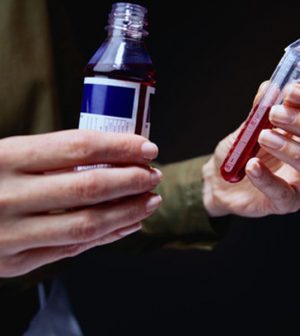- Could Your Grocery Store Meat Be Causing Recurring UTIs?
- Are You Making This Expensive Thermostat Error This Winter?
- Recognizing the Signs of Hypothyroidism
- 10 Strategies to Overcome Insomnia
- Could Artificial Sweeteners Be Aging the Brain Faster?
- Techniques for Soothing Your Nervous System
- Does the Water in Your House Smell Funny? Here’s Why
- Can a Daily Dose of Apple Cider Vinegar Actually Aid Weight Loss?
- 6 Health Beverages That Can Actually Spike Your Blood Sugar
- Treatment Options for Social Anxiety Disorder
Few Prescription Meds Have Dosing Guidelines for Obese Kids

Obesity can change how prescription drugs work, but many medications used to treat children don’t say so on their labels, researchers report.
Federal lawmakers offered drug manufacturers incentives to study how drugs affect kids, but many have not provided safety guidelines for those who are obese, the researchers found.
In the United States, one in six children and teens is obese, according to the U.S. Centers for Disease Control and Prevention. Obesity increases the percentage of fat tissue in the body, which can change how the body absorbs, metabolizes and excretes medicine, the authors of the new study explained.
For the study, scientists at Children’s National Health System and the U.S. Food and Drug Administration’s Center for Drug Evaluation and Research used online search terms related to weight and size to find out how many drugs used to treat children include dosing guidance for those who are obese.
The investigators identified 89 drug labels that provided no dosing information related to obesity. Only four labels mentioned the effects on the medicine of a child’s body mass index (BMI), a rough measure of body fat based on height and weight.
“We are making progress in expanding the number of medicines with pediatric labeling, but we need to do more concerning providing dosing guidelines for children with obesity,” the study’s lead author, Dr. Janelle Vaughns, said in a health system news release. Vaughns is director of bariatric anesthesia at Children’s National Health System in Washington, D.C.
“Moving forward, regulators, clinicians and the pharmaceutical industry should consider enrolling more obese patients in pediatric clinical trials to facilitate the safe and effective use of the next generation of medicines by obese children and adolescents,” she added.
The report was published online Jan. 19 in The Journal of Clinical Pharmacology.
More information
The U.S. National Institutes of Health has more about drug safety for children.
Source: HealthDay
Copyright © 2026 HealthDay. All rights reserved.










